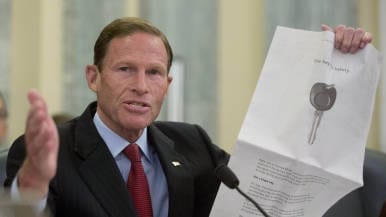7/20/2015

Photo courtesy of Getty Images
Auto safety became political last week on Capitol Hill as lawmakers debated a series of attachments to a transportation bill to be presented next month. Much of the debate went along partisan lines, with the Republican majority blocking several key measures surrounding the massive auto recall epidemic that has plagued the industry over the past decade. Among the many proposals in Wednesday’s Senate Commerce Committee meeting, was another failed attempt by Senator Richard Blumenthal (D-CT) to impose criminal penalties for executives who knowingly lied or concealed information about defects to consumers and regulators. This comes as the U.S. Justice Department is conducting a criminal investigation into the actions of current and former General Motors employees over their foreknowledge of the widespread ignition-switch recall that has contributed to at least 124 deaths. According to the New York Times, the agency is ultimately unlikely to press criminal charges due to current loopholes in the law; however analysts expect a record civil penalty against the automaker, exceeding Toyota’s $1.2 billion penalty agreed upon last year and potentially could be as much as $2 billion. Republican leadership blocked Blumenthal’s proposal, with Democrats Claire McCaskill of Missouri, Gary Peters of Michigan and Joe Manchin of West Virginia all siding with Republicans as well.
In addition to Blumenthal’s proposal, several Democrats were angered by the partisan nature of the committee meeting. Nearly all of the Democratic proposals were voted down along partisan lines, including a bill to ban used-car dealers from selling recalled cars, although a similar measure was approved to prevent rental companies from leasing vehicles with unrepaired defects. Despite the concession, Washington Democrat Matt Cantwell was frustrated by the lack of negotiation in the session, saying that the Republican leadership was “breaking a long tradition” by politicizing safety issues. Prior to the meeting, auto lobbyists circulated a document to the lawmakers, urging them to resist “criminalizing the business of manufacturing.” Staffers on both sides of the isle have indicated that back-room discussions are still possible before the legislation is brought to the floor.
Although his lynchpin proposal was shot down, Blumenthal should take some satisfaction in the fact that the nation’s leading auto regulator, the National Highway Transportation Safety Administration (NHTSA) looks to gain additional clout from the bill. Republicans passed a proposal to double the maximum fine that the agency can impose on automakers for improper management of recalls. NHTSA Administrator Michael Rosekind indicated last month in a public hearing that Fiat-Chrysler may be subjected to the maximum penalty over the misleading and delayed action regarding over 20 separate recalls. Additionally, lawmakers agreed to grant President Obama’s request for a funding increase for the NHTSA’s Office of Defects Investigation (ODI), provided that the NHTSA complies with the recommendations given to the department by a recent audit performed by the Department of Transportation’s Office of the Inspector General. The president has asked to triple ODI’s budget before the end of the decade. Rosekind has enthusiastically and publically stated that all of the recommendations will be in place by the report’s June 2016 deadline.
Even with the concessions many, including officials in the NHTSA and the Department of Justice, must be disappointed by the defeat of Blumenthal’s languishing proposal. The Senator commented after the meeting, “Hiding these deadly defects with near impunity is what the industry has succeeded in doing.” Former federal prosecutor Matthew L. Schwartz explained to the New York Times, “Unlike other regulated industries where health or human safety is involved, there is no criminal statute aimed at the carmakers that does not require specific criminal intent.” An anonymous source has also indicated that the Justice Department cannot find any outright proof of fraud against any individual GM employee. Despite this disclosure, it is still possible that the company itself could face criminal charges even if no individuals do. More than likely however; prosecutors will use the threat of charges, especially regarding wire fraud, to induce a hasty and substantial settlement.
Sources:
Manufacturing.net – Andy Szal
The Detroit News – David Shepardson
The New York Times – Aaron M. Kessler


Join the conversation!